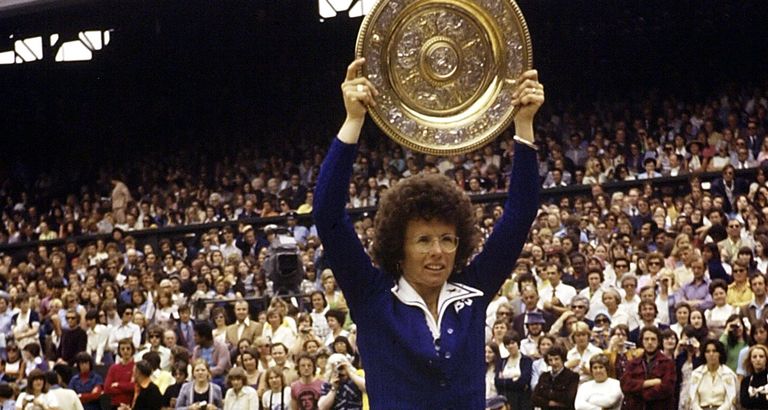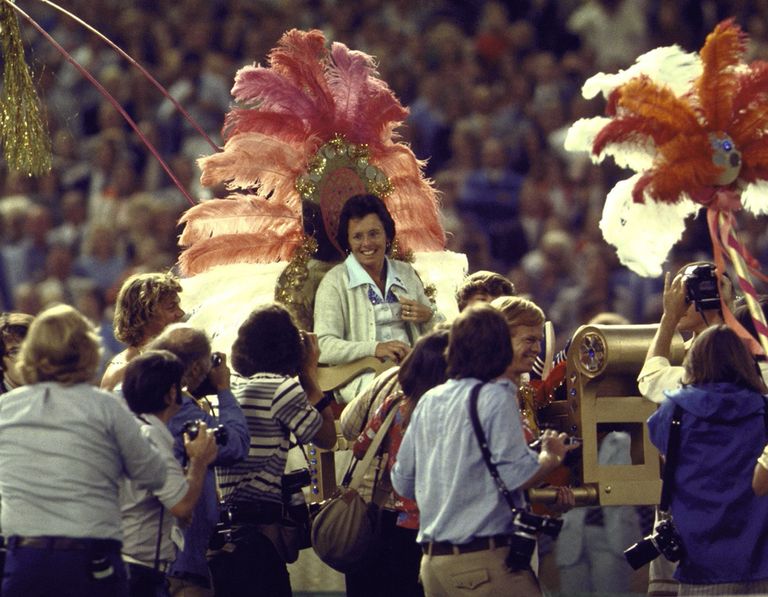
Para los que aman y practican este deporte en la actualidad tal vez este nombre no les diga mucho.
Tal vez tengan un vago recuerdo de la argentina Gabriela Sabattini, de la alemana Steffi Graff o de la checoslavaca Martina Navratilova cuando se hace referencia a los fenómenos tenísticos de todos los tiempos.
Sin embargo para los que hemos superado la medianía de nuestra vida en lo que a edad se refiere es evidente que el nombre de Billie Jean King nos lleva a una de las épocas más gloriosas del tenis femenino mundial.
Pero por sobre todas las cosas a una verdadera reivindicacióna nivel humano del tenis femenino.
Un tenis femenino dividido.
Durante mucho tiempo se dividió al tenis en distintas categorías.
Estaban aquellas jugadoras físicamente bellas, dotadas de una exquisita técnica, que parecían desplazarse en el court.
Pero que, por falta de potencia, nunca podían llegar a instancias decisivas. Ni a ganar grandes torneos o Grand Slam como se los acostumbra llamar en la jerga de este deporte.
Y estaban por, otro lado, aquellas jugadoras dotadas de una fuerza y técnica extraordinarias que dieron, en muchos casos, lugar a sospechas.
Cómo podía una mujer tener semejante potencia, sacar a más de 100 kms de velocidad, etc etc? Contar con un físico escultóreo y modelado para la resistencia no ayudaba por cierto a despejar estas dudas.
Quienes sufrieron estos embates de la crítica fueron una extraordinaria Martina Navratilova la checa naturalizada estadounidense y también en menor medida Steffi Graff y Sabina Hingis (que significó la trasición entre el "reinado" de Steffi Graff y el de las hermanas Williams) por citar solo los casos más notorios. Tampoco las hermanas Williams (Serena y Venus) escaparon a esta estigmatización.
Raras excepciones.
La argentina Gabriela Sabatini pudo escapar un poco a este estereotipo mezclando elegancia y algo de potencia, no demasiada.
Pero tampoco puedo llegar al nivel de las anteriores y/o permanecer por mucho tiempo ranquada como la mejor de su especialidad.
Ganó grandes premios, obvio, pero salvo un breve período no pudo darle consistencia a su carrera. Tal vez no quiso exigir demasiado a su físico.
Un palmares extraordinario.
Billie Jean King que hoy cuenta con 77 años y que se retiró en 1983, ganó en toda su carrera deportiva doce Grand Slams distribuídos de la siguiente manera: en la llamada Catedral del Tenis (Wimbledon) obtuvo nada menos que seis títulos marcando un dominio absoluto. Tres en forma consecutiva (años 1966-1967-1968), un intervalo y de nuevo dos victorias seguidas (1972-1973) y el último título 1975.
En los Grands Slams de Australia y especialmente de Roland Garros tuvo menos suerte: ganó una sola vez en cada uno de llos. Evidentemente el polvo de ladrillo no la favorecía.
En el U.S. Open de los EE. UU ganó en los años 1967-1971-1972 y 1974
Hay que recordar que la llamada era de los Open comenzó en 1968 precisamente con el torneo de Wimbledon.
Una defensora de los derechos deportivos y económicos femeninos.
Billie Jean King fue lo que hoy llamaríamos una declarada feminista y su principal enemigo fue Bobby Riggs, tenista muy machista, sumamente pedante, que llegó a declarar (en relación a la participación de las mujeres en el circuito internacional de tenis): "las mujeres apestan".
Los patrocinadores vieron el negocio y organizaron un partido entre ambos. En tres sets corridos Billie Jean King humilló a Bobby Riggs por un contundente 6-4, 6-3 y 6-3.
"Jugué pensando en los derechos de las mujeres, no se trataba de tenis, sabía que mi victoria (o mi derrota) lograrían un cambio social. Todo eslo lo tenía en la cabeza cuando entré a la pista, desde el primer minuto", dijo después del partido la tenista.
100.000 USD en el bolsillo como premio y un reconocimiento unánime.
A partir de ese momento el Grand Slam de Nueva York interpretó el mensaje y convirtiéndose en un verdadero pionero comenzó a pagar lo mismo a hombres y mujeres.
El resto es historia más reciente: su vida fue llevada al cine e interpretada por Emma Stone y Steve Carell. Y muchos la consideran un mal recuerdo de una brecha salarial que aún hoy sigue existiendo, un problema sin resolver aunque ya haya pasado casi medio siglo.

For those who love and practice this sport today, perhaps this name does not mean much.
Perhaps they have a vague memory of the Argentine Gabriela Sabattini, the German Steffi Graff or the Czechoslovakian Martina Navratilova when referring to the tennis phenoms of all time.
However, for those of us who have surpassed the middle of our lives in terms of age, it is evident that the name Billie Jean King takes us to one of the most glorious eras of world women's tennis.
But above all, to a true vindication at the human level of women's tennis.
A divided women's tennis.
For a long time tennis was divided into different categories.
There were those physically beautiful players, gifted with an exquisite technique, who seemed to move on the court.
But who, for lack of power, could never reach decisive instances. Nor to win major tournaments or Grand Slams as they are usually called in the jargon of this sport.
And on the other hand, there were those players endowed with extraordinary strength and technique that gave rise, in many cases, to suspicions.
How could a woman have such power, serve at more than 100 kms speed, etc. etc.? Having a sculpted physique and modeled for endurance certainly did not help to dispel these doubts.
Those who suffered these onslaughts of criticism were an extraordinary Martina Navratilova, the Czech naturalized American and also to a lesser extent Steffi Graff and Sabina Hingis (which meant the transition between the "reign" of Steffi Graff and the Williams sisters) to cite only the most notorious cases. Neither the Williams sisters (Serena and Venus) escaped this stigmatization.
Rare exceptions.
The Argentine Gabriela Sabatini was able to escape a little from this stereotype by mixing elegance and some power, not too much.
But neither could she reach the level of the previous ones and/or remain for a long time ranked as the best in her specialty.
She won great prizes, obviously, but except for a brief period she could not give consistency to her career. Perhaps she did not want to demand too much of her physique.
An extraordinary palmares.
Billie Jean King, who today is 77 years old and who retired in 1983, won twelve Grand Slams in her career, distributed as follows: at the so-called Tennis Cathedral (Wimbledon) she won no less than six titles, marking an absolute dominance. Three in a row (1966-1967-1968), an interval and again two consecutive victories (1972-1973) and the last title in 1975.
In the Grands Slams of Australia and especially Roland Garros he was less lucky: he won only once in each of them. Evidently the clay was not in her favor.
At the U.S. Open she won in 1967-1971-1972 and 1974.
It should be remembered that the so-called Open era began in 1968 precisely with the Wimbledon tournament.
An advocate of women's sporting and economic rights.

Billie Jean King was what today we would call a declared feminist and her main enemy was Bobby Riggs, a very macho tennis player, extremely pedantic, who declared (in relation to the participation of women in the international tennis circuit): "women stink".
The sponsors saw the business and organized a match between the two. In three straight sets Billie Jean King humiliated Bobby Riggs by a resounding 6-4, 6-3, 6-3.
"I played with women's rights in mind, it wasn't about tennis, I knew my win (or loss) would bring about social change. All this was in my head when I entered the court, from the first minute," the tennis player said after the match.
100,000 USD in her pocket as a prize and unanimous recognition.
From that moment on, the Grand Slam of New York interpreted the message and, becoming a true pioneer, began to pay the same to men and women.
The rest is more recent history: her life was made into a movie and played by Emma Stone and Steve Carell. And many consider it a bad memory of a wage gap that still exists today, an unresolved problem even though almost half a century has passed.

Fuente de las imágenes / Source of the images: Billie Jean King Website.
Congratulations!
You have recieved a coconutty upvote! 🥥
Thank you for contributing to the Blurt Blockchain!
Keep up the great work!
Curated by @outofthematrix!
Please take a moment to vote for my witness.
You can do this by logging into your wallet with your active key! 🗳️ https://blurtwallet.com/~witnesses?highlight=outofthematrix
Thank you for voting and supporting my content @curationcoconut.